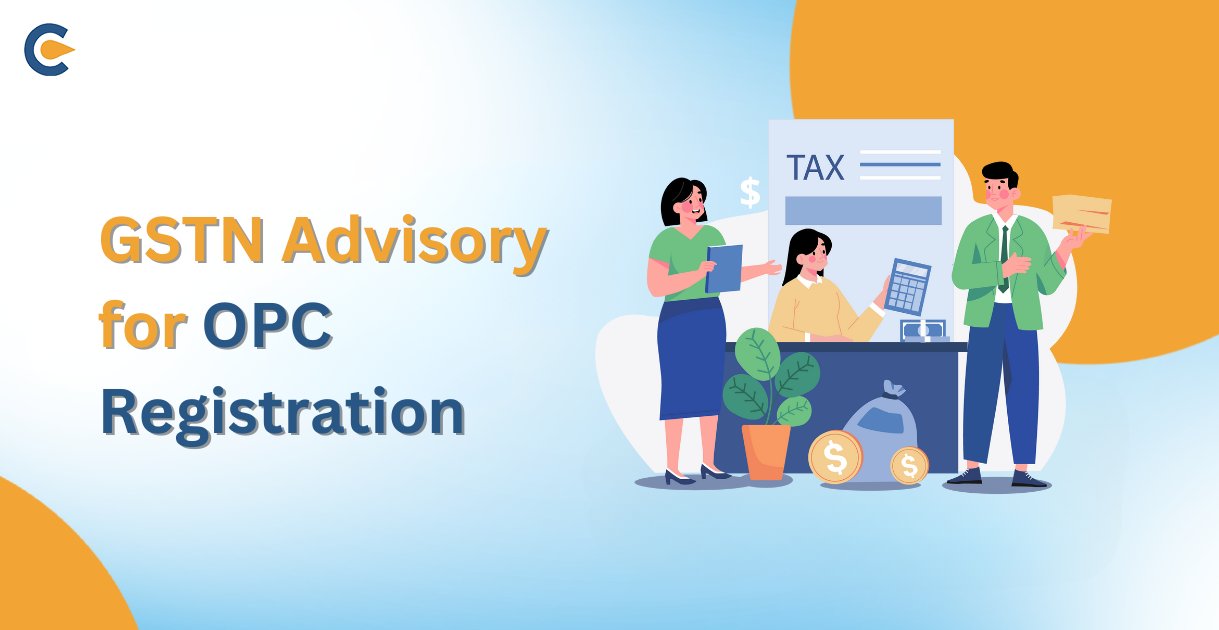GSTN Advisory for OPC Registration: The Goods and Services Tax Network (GSTN) Advisory for One Person Company (OPC) Registration highlights how India’s tax system is changing and how this affects sole proprietors. The OPC structure has been popular in India as a result of its limited liability advantages and easier compliance requirements, particularly in light of the country’s growing startup culture. The GSTN Advisory for OPC Registration is a crucial resource for prospective OPCs, providing guidance on the registration procedure under the Goods and Services Tax (GST) framework.
This GSTN Advisory for OPC Registration helps negotiate the regulatory environment with ease and demystifies the complexities of GST compliance, which creates a hospitable atmosphere for entrepreneurial work. OPCs can assure regulatory compliance and add to the larger story by adhering to GSTN Advisory for OPC Registration concerning economic upliftment and initiating development in the country.
Role of GSTN Advisory for OPC Registration
The GSTN Advisory for OPC Registration plays a huge role in the establishment of OPCs in the country. GST was introduced to eliminate the cascading effects of taxes from the country and streamline the whole taxation process, and up to a certain extent, it has been successful in this. The GSTN Advisory for OPC Registration helps in initiating the process of OPC registration and fastens the pace of the process with fewer complexities in taxation and compliance. Goods and Service Tax Network advisory serves the purpose since it introduced the stepwise guide for the registration process, taxation requirements, and legal compliance to the companies registered under section 2 (62) of the Companies Act of 2013.
Essential Aspects of GSTN Advisory for OPC Registration
GSTN Advisory for OPC Registration holds much importance for new entrepreneurs as they act as a guiding light for them in fulfilling their GST obligations. These essential aspects of the Goods and Service Tax Network Advisory are as follows –
GST Registration Process
The GSTN Advisory for OPC Registration has laid down rules and procedures for these one-person companies to get themselves registered under GST by following the required compliances. It has released the procedure for registration, the documentation needed, and the eligibility criteria for these individuals to get themselves registered. It has made the process much easier and free of any confusion for entrepreneurs who have very little to no knowledge about the process.
Obligations in Regulatory Compliance
The GSTN Advisory for OPC Registration ensures that individuals do not neglect the obligations that they are expected to meet to fulfil the compliance requirements. It reminds these OPCs about regular compliances like annual return filings, GST filings, record keeping, and Taxation liabilities. The advisory is responsible for making sure that these OPCs are complying with the procedures on time by laying down the stepwise process of filing these taxes and annual returns.
Input Tax Credit Scheme
GST Registration entitles the OPCs to claim the Input Tax Credit just like the other business forms do. In this, they are made eligible to take back the input of GST paid on the business things brought to carry it on. They lay down the procedure through which the OPCs can claim the GST back from the government which they have paid in the business proceedings in the previous financial year. This makes them take the benefit of the scheme and reduce their cost while continuing the business all on their own. This helps them optimize their tax strategies and gives them the required knowledge about the ITC and the conditions in which they can claim it.
Provisions of Anti-profiteering
GSTN Advisory for OPC Registration gives insights into the Anti-profiteering provisions through which the deductions in GST rate are forwarded to the customers as well, guaranteeing their profit through the provisions. The advisory makes sure that the provisions are being followed by these OPCs so that no penalties are made against them for non-compliance.
Record Keeping
Goods and Service Tax Network Advisory focuses on the importance of keeping the books of accounts in the process of GST compliance. It helps the OPCs to maintain specific records that are necessary and the period for which they have to keep them properly.
Points to Keep in Mind for GST Compliance
This compliance fulfilment is not only legally binding but also required to maintain the credibility of the company in the market, which eventually will help them to make a stand in the market for a longer period. OPCs can:
Review of Compliance
A regular review of all the necessary compliances should be done by the OPCs and failure to do so will lead to legal and financial issues in the form of penalties. If the OPCs are adhering to the compliances on a regular and periodic basis they can evade any penalties and perform the business chores in a free state.
Professional Assistance
OPCs can take some professional assistance from the CAs, tax professionals, and legal experts if they are facing trouble in figuring out the process requirements and procedure of compliance required to comply with the laws. In complex situations, our professionals at Corpbiz can help them and take them out of difficult situations.
GSTN Advisory for OPC Registration Process
GSTN Advisory for OPC Registration mainly focuses on streamlining the OPC registration process and making it less complex so that more and more entrepreneurs can get through with the OPC registration even if they are not very educated. The registration process currently involves the following steps –
- Before going through the GST registration, the OPCs must adhere to the eligibility criteria set for them. They should look at the threshold limit of the business turnover for them to register themselves.
- They need to prepare the documentation for the registration process. The documentation requires documents like address proof, identity proof (PAN, Aadhar, Driving License, Voter ID, etc), bank statements, certificate of business incorporation, and memorandum of association.
- OPCs can be registered under GST through online mode on the GST portal. They need to upload all the required documents and complete the verification process by paying the mandatory fees for registration. Online mode registration makes sure that all the documents necessary are uploaded and the application is not rejected on account of the missing document.
- As soon as the registration is done, the approval is awaited from the authorities. If the registration is approved, the applicant will get the 15-digit GSTIN required to commence the business without GST restrictions. If the approval is not made, the applicant should check on the portal the grounds mentioned for not approving so that they can be amended.
- GSTN Advisory for OPC Registration also provides information for regulatory compliance post-registration. OPCs are required to submit period books of record, adhere to tax obligations, and file annual returns.
Conclusion
To sum up, the GSTN Advisory for OPC Registration is an invaluable resource for OPCs. Through the guidance of the registration procedure, compliance requirements, and best practices, OPCs are enabled by the advice to establish themselves under the GST regime confidently. Following the GST laws becomes essential for OPCs to expand and succeed over the long term as India’s entrepreneurial scene develops. OPCs can maximize compliance efforts, reduce risks, and reap the rewards of formalized business operations by utilizing the insights offered by the GSTN guidance.
Corpbiz can help the OPCs in following the advisory made for the OPC registration in following the GST compliances. Our skilled GST professional can help you with regulatory compliance as well as GST registration and make you worry-free about legal complications and associated fines and penalties.
Frequently Asked Questions
Is it mandatory to get GST registration for an OPC?
No, an OPC doesn't need to get registered under GST if its annual turnover is below the threshold limit. However, if the OPC is involved in delivering its goods and services in the other state, then it has to get the GST registration.
Who can OPC approach in case of difficulty in compliance?
OPCs can get some professional assistance from the CAs, tax professionals, and legal experts if they are having trouble figuring out the process requirements and compliance procedures required to comply with the laws. In complex situations, these professionals can help them and take them out of difficult situations.
What are the benefits of GST registration for an OPC?
The OPCs have so many benefits after getting GST registration like they get legal recognition, credibility in the market, input tax credit benefits, streamlining tax compliance, interstate business opportunities, etc.
Where can a person register for GST as an OPC?
The GSTN has released an advisory stating that if the taxpayer wishes to register for GST as a “One Person Company,” they may use the dropdown list option “Others” to pick Constitution of Business under the “Business Details” column on the “Part B” of the GST Registration Form (REG-01).
Under which Act is an OPC registered?
An OPC is registered under section 2 (62) of the Companies Act of 2013.
What is the relevance of GSTN?
Goods and Service Tax Network has set the platform for individuals and companies to pay their indirect taxes without missing any regulatory compliance and in an easier manner. The GSTN Advisory helps keep track of tax implications, book of records, and annual returns filing to negate fines and penalties.
When was GST introduced in the country?
GST was introduced in the country on July 1st, 2017, through the 101st Constitutional amendment by the government of India.
What is the reason behind the growth of OPC registration?
The OPC structure has been popular in India as a result of its limited liability advantages and easier compliance requirements, particularly in light of the country's growing startup culture.
What are the types of GSTN in the country?
The types of GSTN in the country are integrated Goods and Service Tax (IGST), Central Goods and Service Tax (CGST), State Goods and Service Tax (SGST), Union Territory Goods and Service Tax (UTGST).
Read Our Article: A Guide On GST Audit Checklist For Businesses











